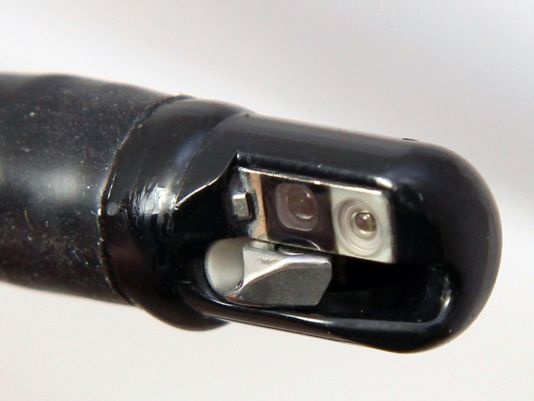
(Photo: AP)
Amid rising concerns about super bug outbreaks linked to contaminated medical scopes, federal regulators are demanding more rigorous testing of the machines used to clean the devices — and cracking down on manufacturers that don’t meet government standards.
The steps are part of a Food and Drug Administration effort to ensure the effectiveness of Automated Endoscope Reprocessors, or AERs, which are akin to high-tech dishwashers used to clean medical scopes between uses. The measures focus specifically on checking the reprocessors’ efficacy in cleaning and disinfecting duodenoscopes, which have been found in some cases to spread antibiotic-resistant bacteria from patient to patient.
The FDA has directed AER makers to use tougher tests to validate their reprocessors’ effectiveness in sanitizing the scopes, officials say, and the agency also is inspecting some companies’ manufacturing facilities to assess their production and quality controls. The inspections have led to at least one AER manufacturer being cited for not assuring that its reprocessors clean duodenoscopes properly, FDA documents obtained by USA TODAY show.
USA TODAY first reported on the duodenoscope problem in January, finding that scores of hospital patients had contracted antibiotic-resistant infections from bacteria trapped in the scopes. In March, the newspaper revealed that all the outbreaks occurred in hospitals that used reprocessors to clean the scopes, which are run down patients’ throats to treat gallstones, tumors and other blockages in the bile and pancreatic ducts.
The FDA, which focused its initial investigation on the design of the duodenoscopes themselves, subsequently revealed that it also would review the efficacy of AERs. After examining manufacturers’ data, the agency has determined that more rigorous testing is needed to prove the reprocessors clean the scopes reliably.
 William Maisel is chief scientist and deputy center director for science at the Food and Drug Administration’s Center for Devices and Radiological Health. (Photo: Food and Drug Administration)
William Maisel is chief scientist and deputy center director for science at the Food and Drug Administration’s Center for Devices and Radiological Health. (Photo: Food and Drug Administration)
“The agency considers this an urgent public health matter of great importance, so it is our expectation that all (AER) firms … will respond quickly to our inquiries,” William Maisel, deputy director at the FDA’s Center for Devices and Radiological Health, said in an interview. “We did ask each of the AER firms to conduct additional testing … (and) to make the testing more challenging.”
Maisel confirmed that the FDA has done on-site inspections at some manufacturers’ production facilities, but he declined to provide details on which companies have been visited or what was found.
“I’m not going to comment on specifics of our ongoing AER investigation,” he said.
USA TODAY contacted several AER manufacturers for comment and all said they are cooperating with the FDA to address any concerns regarding their testing protocols or manufacturing practices.
“We have responded to and satisfied all FDA requests, including revalidation of test methods and providing supporting documentation,” says Craig Smith, senior vice president of regulatory affairs and quality assurance at Cantel Medical, which owns Medivators, a leading AER manufacturer. “We are confident in our products.”
Medivators has “conducted a broad-based review of our internal processes while considering FDA feedback,” Smith added, noting that the company will “follow FDA recommendations and protocols, and make improvements where necessary.”
PROBE'S FOCUS QUESTIONED
Since USA TODAY’s ongoing investigation initially identified duodenoscope-associated superbug outbreaks in Pittsburgh, Chicago and Seattle, more infections have emerged at hospitals in Los Angeles, Philadelphia, Milwaukee,Worcester, Mass., and other cities. Many involve CRE, a bacteria with mortality rates of 40% or more.
The FDA warned in February that bacteria can lodge at the scopes’ tip, in a mechanism that controls small tools used to trim tissue or open intestinal ducts. The agency said contamination can remain even if hospitals heed all reprocessing guidelines, and it is investigating whether new scope designs or cleaning protocols are needed.
Some medical device experts say the FDA has been too slow to recognize and investigate the potential role of AERs in the duodenoscope-related superbug outbreaks. The agency’s review of the scopes’ contamination problems began last year, but it waited until this spring to ask AER manufacturers for data showing that their reprocessors could clean duodenoscopes effectively.
 Lawrence Muscarella is a biomedical engineer and independent hospital-safety consultant. (Photo: handout)
Lawrence Muscarella is a biomedical engineer and independent hospital-safety consultant. (Photo: handout)The FDA’s conclusion that more testing is needed “ties up a loose end in the investigation, but raises the question of why they didn’t pursue this angle sooner,” says Lawrence Muscarella, a Pennsylvania health care consultant who advises hospitals and medical device manufacturers on safety issues.
"If the manufacturers (of AERs) didn't have acceptable validation data to prove that these scopes could be reprocessed safely," he says, "then it's fair to ask why the FDA hadn't determined this well before these (infection) problems became an issue."
The FDA has not sought to restrict the use of duodenoscopes, insisting that infection risks remain relatively low and the devices remain the safest way to treat dangerous conditions. The scopes, which are used about 650,000 times a year nationwide, often are used in lieu of complex surgeries with high complication rates.
The FDA also has not issued any warning about the use of AERs, though it has suggested that hospitals consider steps to supplement automated reprocessing of duodenoscopes.
“To this day, by far the most common reason duodenscopes are not properly reprocessed, if and when they remain contaminated, is because of user error,” Maisel says, noting that meticulous adherence to existing cleaning guidelines can minimize infection risks.
TESTING FLAWS CITED
While the FDA declined to discuss its recent inspections of AER manufacturers, records obtained by USA TODAY show the agency cited one company earlier this year for significant lapses in validating its reprocessors' efficacy in cleaning duodenoscopes.
The company, Pennsylvania-based Custom Ultrasonics, has a history of FDA citations, including an agency order that effectively shut down production of two of its AERs several years ago. In the latest instance, agency inspectors found in an April inspection that the company failed to validate its System 83 Plus reprocessor with a newer type of duodenoscope that has been tied to several superbug outbreaks.
“From January 2013 to April 2015, the firm has received complaints of (the scopes) testing positive for bacterial cultures,” the inspectors wrote in an April 24 report. “The firm, however, did not validate these specific duodenoscopes within the System 83 Plus to address their capabilities of being reprocessed.”
The inspection is the latest in a series of enforcement actions taken against Custom Ultrasonics dating back to 2007, according to FDA records obtained by USA TODAY through a Freedom of Information request.

In 2012, the agency ordered the company to cease manufacturing and distributing the System 83 Plus and another reprocessor, and that order remains in effect, according to an FDA spokesman. The order, which also required the company to recall some devices, was based on Custom’s alleged failure to validate a software upgrade it had adopted for the reprocessors.
The problems cited in this year's inspection relate to the company's failure to re-validate System 83 Plus reprocessors that were put in the field before the company was ordered to stop producing the machines.
In a statement to USA TODAY, Custom Ultrasonics president Alicia Nakonetschny noted that none of the company's reprocessors has been identified as a contributing factor in a duodenoscope-related superbug outbreak.
“We are complying and working cooperatively with the FDA,” the statement said. “Custom Ultrasonics, Inc. has no concerns with the safety and efficacy of the System 83 Plus AER. We are steadfast in our work regarding any and all requests from the FDA.”



